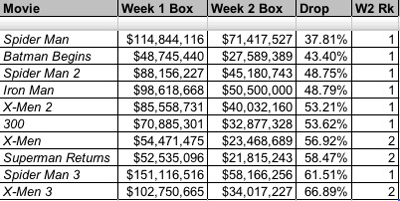Box Office Special - Week Two "Super" Stars
Week 2 of "Iron Man's" reign is in the books. At over $50 million, it easily destroyed "Speed Racer," which itself had trouble out dueling one of this year's more atrocious releases, "What Happens In Vegas." Ashton Kutcher notwithstanding, this week belonged to Downey Jr. once again.
"Iron Man" has had me thinking a great deal about the success that film studios have had in mining comic books for content. This summer audiences will be treated to several comic adaptations: "Iron Man," "The Dark Knight," "The Incredible Hulk," "Wanted," and "Hellboy 2." There's even a superhero film not drawn from a comic in "Hancock."
I've been working on a series of posts that will be appearing sometime in the coming weeks that will look at what I'm calling "The Superhero Century." Since "X-Men" in 2000, comic adaptations have exploded, and for good reasons. These films have been incredibly successful with audiences, and "Iron Man" is just the most recent example. Now, more in depth discussion of these films will have to wait for the time being, but I did want to offer up a little taste.
Below is a chart I just pulled together. It looks at the 10 most financially successful comic adaptations since the year 2000. Each of these films opened at #1 upon release, and you can see their first week revenue as well as their second week. The films have been listed in order of percent drop from week one to week two.

What's interesting, right off the top, is that these films could very well be ordered in terms of quality. If you ask most people to name their favorite of the recent comic book films, most will name the first or second "Spider Man," "Batman Begins," or "X-Men 2." Looking at this data, one might surmise that "Iron Man" will be on a lot of people's favorites list going forward.
Of course, there's many factors—other than a film's lack of quality—that could contribute to a large drop off in box office revenue: another blockbuster opening, high initial turnout, or even genre fatigue, could all lead to less than stellar second weeks. Some of these factors certainly are at play here, but none go far enough to outweigh the quality factor.
Clearly, when a film opens huge, that sets the stage for a huge dropoff. If everyone runs out and sees a film in its opening week, there's going to be fewer people to see it the next week. Then again, the first "Spider Man" violates that idea. With the second largest opening week of all ten films, "Spider Man" also had the lowest drop. Similarly, "Iron Man" and "Spider Man 2" opened huge and still saw crowds coming out in week two. It's not unreasonable to think that quality could lead to multiple viewings by fans, which would help buoy week two receipts.
The only film to see a serious challenge was "Superman Returns," which opened the week before "Pirates of the Caribbean 2." By that point though, it's more likely that "Superman's" week one flop had suppressed week two attendance somewhat, so it wouldn't have taken much to out-duel the man of steel's $21 million. Maybe the most hilarious fall-off (partly due to schadenfreude in my eyes, no doubt) was for Brett Ratner's "X-Men 3," which not only saw the largest week-to-week dropoff, but also came in second in week two to "The Break-Up." But Jen Aniston was still box office gold back then, so there's no shame in that right? Right...
The Horrors of 2008 spreadsheet has been updated in a couple of ways this week. I've added information on Metacritic score, IMDB score, and BGH Rating, as well as "Open Ratio," a number that describes the percentage of a film's overall box office that came in during opening weekend.

